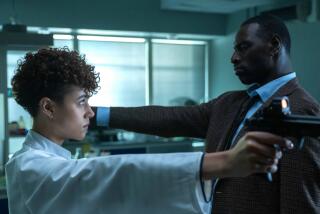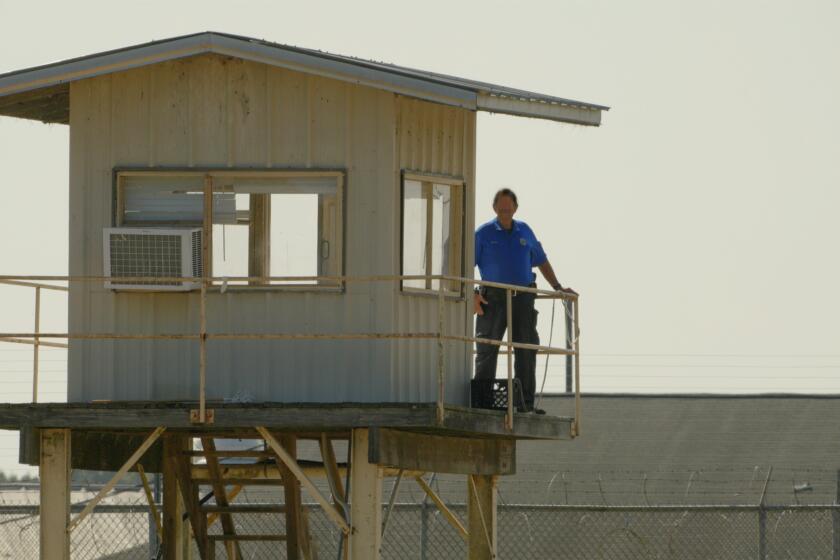MOVIE REVIEW : ‘Rapid Fire’ Launches Heir to Lee’s Kung Fu Legacy
- Share via
It is always difficult for a son or daughter to follow in a famous parent’s footsteps, especially if the parent is in show business--and happens to be the late, legendary Bruce Lee, the ultimate kung fu star. However, judging from the strong impression Brandon Lee makes in his first starring role in the dynamic hard-action film “Rapid Fire” (citywide), he has what it takes. What’s more, “Rapid Fire” is a much better movie than “Enter the Dragon,” the film that made Bruce Lee an international star.
Brandon Lee has lots going for him: striking Eurasian features, genuine acting ability in contrast to his father, who alternated between sneers and grimaces, and most important, a style all his own. Tall and lean, Lee has a direct, matter-of-fact approach to his formidable martial-arts skills in contrast to his father, whose appeal rested largely upon the breathtaking balletic grace he brought to his kung fu moves. For the son, martial arts is but one aspect of his personality, not the raison d’etre it was for his father. Indeed, his last picture, “Showdown in Little Tokyo,” in which he co-starred, showed off his flair for comedy.
As Jake Lo, Lee is a college arts major living in Los Angeles who is maneuvered into attending a campus gathering marking the second anniversary of the Tian An Men Square massacre, where Jake witnessed the death of his father, a U.S. Army Intelligence officer. Bitter about his father’s death, which he regards as a pointless sacrifice, he had not wanted to attend or participate in the event. Yet no sooner does he arrive than he witnesses a Chicago gangster (Nick Mancuso), whose empire is crumbling, assassinate a distributor for a Golden Triangle drug lord (Tzi Ma), who refuses to give a bigger cut to Mancuso.
So much for the plot, which you might not catch if you’re not paying close attention, thanks to the exhilarating breakneck pacing of Dwight Little’s astute direction. The linchpin of the film is writer Alan McElroy’s skillful rendering of the gradually evolving relationship that develops between Jake and tough, high-principled Chicago cop Mace Ryan (Powers Boothe). As Jake moves from a witness to be protected to the key position on Ryan’s team he’s reluctantly faced with the fact that Ryan is a man very much like his late father. “Rapid Fire” isn’t just about the good guys nailing the bad guys but about a young man discovering, through a surrogate father, that there was meaning in the loss of his own father’s life.
Putting a further spin on the Jack-Mace friendship is the vibrant no-nonsense presence of Kate Hodge as Ryan’s resilient partner, who may be even more attracted to the divorced Mace than to Jake.
In all aspects “Rapid Fire” is a handsome, quality production anchored by solid performances right down the line, highlighted by a standout portrayal by Raymond J. Barry as a corrupt FBI agent. Both Barry and Tzi Ma are able to bring recognizable human dimension to their villainy. Above all, “Rapid Fire” (rated R for violence, sexuality and language) launches Brandon Lee as a new martial-arts star who conceivably could move beyond the orbit of action films.
‘Rapid Fire’
Brandon Lee: Jake Lo
Powers Boothe: Mace Ryan
Nick Mancuso: Tony Serrano
Raymond J. Barry: Agent Stuart
Kate Hodge: Karla Withers
Tzi Ma: Kinman Tau
A 20th Century Fox presentation. Director Dwight H. Little. Producer Robert Lawrence. Executive producers Gerald Olson, John Fasano. Screenplay Alan McElroy, based on a story by Cindy Cirile and McElroy. Cinematographer Ric Waite. Editor Gib Jaffe. Costumes Erica Edell Phillips. Music Christopher Young. Production design Ron Foreman. Art director Charles Butcher. Set designer Natalie Richards. Set decorator Leslie Frankenheimer. Sound Rob Janiger. Running time: 1 hour, 36 minutes.
MPAA-rated R (for violence, language and sexuality).
More to Read
Only good movies
Get the Indie Focus newsletter, Mark Olsen's weekly guide to the world of cinema.
You may occasionally receive promotional content from the Los Angeles Times.








